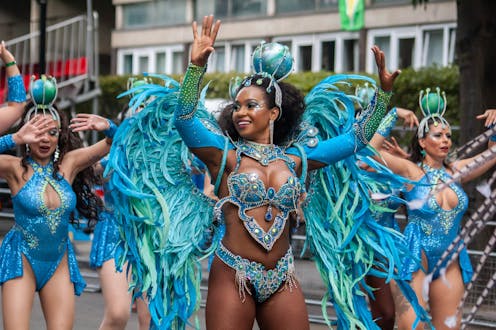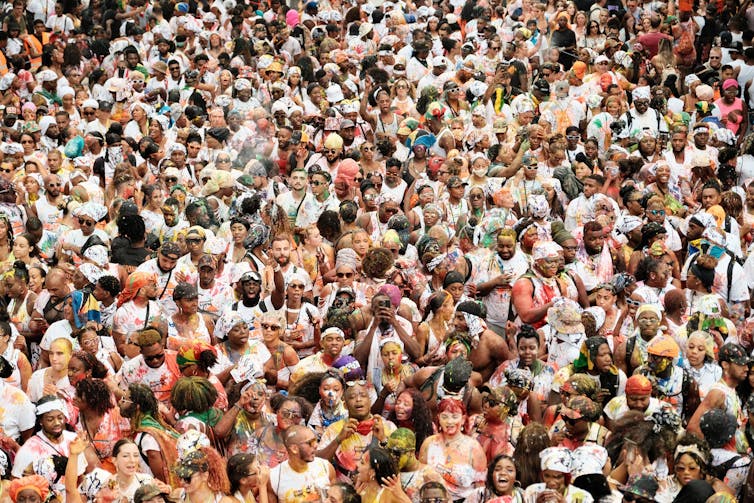
Today’s Notting Hill Carnival, first held in its streets in 1966 when it was led by a Trinidadian steel band, is a glorious cultural blend. It’s a hotch-potch of traditions, music, dancing and food which commemorates the history of black British communities and integrates others.
But the future of Notting Hill Carnival is now in doubt amid concerns that the event doesn’t have the funding to ensure the safety of attendees.
One touted solution is to move the carnival to another location. Writing in the Guardian last year, retired black Met superintendent Leroy Logan recommended a more open space, such as Hyde Park. Policing would be far easier there, with walled boundaries removing escape routes for potential “trouble makers”.
But holding the carnival in Hyde Park could alter the way that the carnival is enjoyed in ways that would be fundamental to the community it comes from.
My research in creative performance with communities explores the joy that comes from participating in events and activities that celebrate our collective strengths and differences. I look at the important issues of lived experiences and cultural heritage in events like Carnival.
This article is part of our State of the Arts series. These articles tackle the challenges of the arts and heritage industry – and celebrate the wins, too.
The Russian philosopher Mikhail Bakhtin (1895-1975) wrote of a “carnival sense of the world”. For Bakhtin, carnival was an unleashing of energies, in which hierarchies disappeared, and people were free to mix with each other.
For his critics, the liberating energy that Bakhtin describes can be too easily co-opted to dominant cultures, especially where carnival can be made to serve the market’s insatiable appetite. While the democratising dynamics of carnival are valuable, it is also important to consider the particular histories and places in which its traditions and practices have developed. Even joy is contingent on place and context.
The Notting Hill Carnival is currently free to over 1.5 million visitors. Controlling access would severely contract its size and almost certainly lead to commercial exploitation, reducing its renowned inclusivity.
What’s more, the right to be publicly seen and heard carries intense symbolic significance for the Caribbean community. This is profoundly important in the wake of the 2018 Windrush scandal, in which the government tried to remove many black citizens who had lawfully lived and worked in Britain for decades under the terms of the British Nationality act of 1948.
Many of this Windrush generation, a large number of whom lived in Notting Hill and north Kensington, made a huge contribution to the rebuilding of the British economy, having been invited to the country in the wake of the second world war. In their daily lives however, they suffered racism and harassment which undermined the right they had to make their homes as British citizens.
The history of the carnival
It is important to recognise that the sights and sounds of the Notting Hill Carnival are tied to the history of black people’s displacement and exploitation by white enslavers and colonialists. An exuberant street presence is a culturally distinctive statement of resistance and heritage.
Author Dan Hancox has written about the fact that enslaved people in the Caribbean were not permitted to take part in the European colonialists’ Mardis Gras balls.

In 18th century Trinidad, a ritual called Cannes Brulees (sugarcane burning), in which sticks were used to perform the rhythms of African drumming, reconnected these transplanted peoples with their places of origin, and sounded an act of resistance.
Liberation is still enacted today in the right to make music and dance through the streets. Interviewed by Hancox in 2023, CEO of the Notting Hill Carnival Trust, Matthew Philip, pointed to the significance of the newly emancipated black presence in Trinidad’s streets, from which they had been banned by their colonial masters, and their joyful mockery of the white governing class.
Any considerations of safety at the Notting Hill Carnival must also consider how – despite this exuberantly joyful community celebration of black diasporic culture – the event has been commonly portrayed as a flash-point of racial tensions.
Social geographer Peter Jackson has pointed to the racialised media representation of “black youth” after unrest in 1976, during which carnival goers clashed violently with a heavy police presence.
Steve McQueen’s 2020 drama Mangrove portrayed the tensions with the police in the 1970s. In a notable scene outside Trinidadian immigrant Frank Crichlow’s restaurant, the film captured the combination of resistance and joy expressed in West Indian music and dancing. Crichlow was part of the Mangrove Nine, the group of black activists who were tried in 1971 at the Old Bailey for inciting a riot, after repeated police raids on Crichlow’s restaurant.
The group’s acquittal was an important milestone in the history of the rights of black people to live and work without harassment in the London area they were trying to make their home under difficult conditions.
When West Indian migrants came to Notting Hill they were housed in slum conditions. They were charged extortionate rents, often in dilapidated properties once built for the wealthy. Having lived through this and built a thriving community, black residents have in recent decades been forced to move out following the area’s “regentrification”. The trend again points to the displacement of black and working class populations, this time at the housing market’s convenience.
To relocate the carnival from the streets of Notting Hill would risk continuing these histories of displacement of black communities, and ignore the huge symbolic significance of street celebration to black people in Britain and beyond.
Unquestionably, the government must act in the interest of public safety. As it considers the best ways to protect attendees, it will no doubt also assess the carnival’s considerable social and economic benefits
To guarantee these, officials must work with communities whose heritage and citizenship is bound up with the carnival. They need to balance issues of safety with those of access and heritage, and with the need to express a joy that emerges not entirely spontaneously, but from long and complex histories of displacement, relocation and resistance.
Maggie Inchley does not work for, consult, own shares in or receive funding from any company or organisation that would benefit from this article, and has disclosed no relevant affiliations beyond their academic appointment.
This article was originally published on The Conversation. Read the original article.







